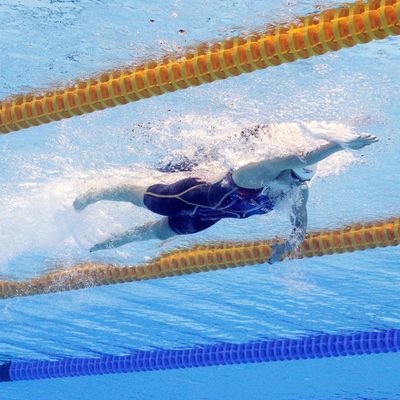
An observation concerning Katie Ledecky: The woman is chill. Many swimmers, for example, have a pre-race ritual of warming up their bodies by, say, pummeling their thighs with their balled-up fists; Michael Phelps in particular does that signature back-slap-arm-swing thing before each race. Ledecky goes in for no such nonsense, as the New York Times reported in July. “In the starting blocks before a race, Ledecky does not stroke her biceps or pound her fists against her own body,” writer Michael Sokolove notes. “She just stretches her neck a bit and shakes her arms out, then dives in the pool and wins.”
That, to Mayo Clinic exercise scientist Michael Joyner, is perhaps the most intriguing question about Ledecky. “The thing elites do that people forget about — they’re able to simultaneously have maximum effort and maximum relaxation,” Joyner told me. “That’s the great philosophical question. How can you become totally engrossed in what you’re doing and stay relaxed and focused, and not tighten up?”
There’s no single answer to this question, but cognitive scientists like Bradley Hatfield of the University of Maryland have some intriguing ideas, including this one, which he shared recently with Nautilus: Elite athletes have quieter minds than the rest of us. When Olympians are competing, he theorizes, their brains are unusually good at tamping down “any nonessential neural processes,” especially those that “could be labeled as ‘noise.’” The irrelevant mental processes are turned down; the relevant ones are turned up. It’s a product of “a brain that is precisely and remarkably matched in its engagement with its task demands,” he said. The end result is a state of mind that is equal parts all-out effort and all-out chill — something else about Olympians to envy, beyond the medals and easy access to McDonald’s.




